Shows
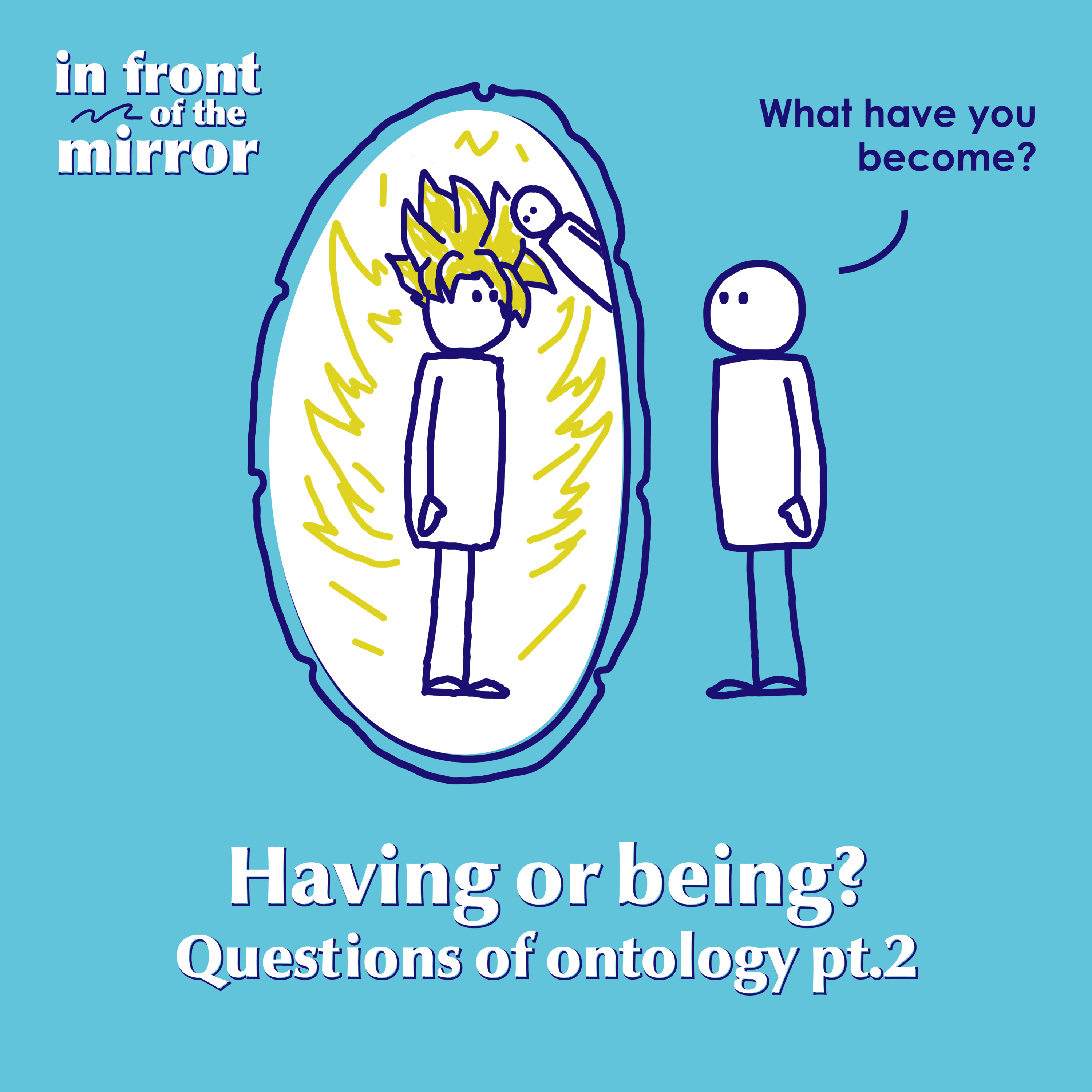 In Front of the Mirror - The English Podcast#06 Having or being? Questions of ontology pt. 2It has even been said that depression, anorexia, and phobia are not something we ‘have’, rather they are modes of being of the person. But what does ‘being’ depressed, anorexic, or phobic mean?It has even been said these pathologies do not happen to the person, they are worlds instead, which persons inhabit. So: one does not have autism, one is autistic. Or, at least, this is what they say.It has even been said that one has become schizophrenic, as if it were the culmination of a personal, and unique trajectory. But, which formulations can make...2025-07-2836 min
In Front of the Mirror - The English Podcast#06 Having or being? Questions of ontology pt. 2It has even been said that depression, anorexia, and phobia are not something we ‘have’, rather they are modes of being of the person. But what does ‘being’ depressed, anorexic, or phobic mean?It has even been said these pathologies do not happen to the person, they are worlds instead, which persons inhabit. So: one does not have autism, one is autistic. Or, at least, this is what they say.It has even been said that one has become schizophrenic, as if it were the culmination of a personal, and unique trajectory. But, which formulations can make...2025-07-2836 min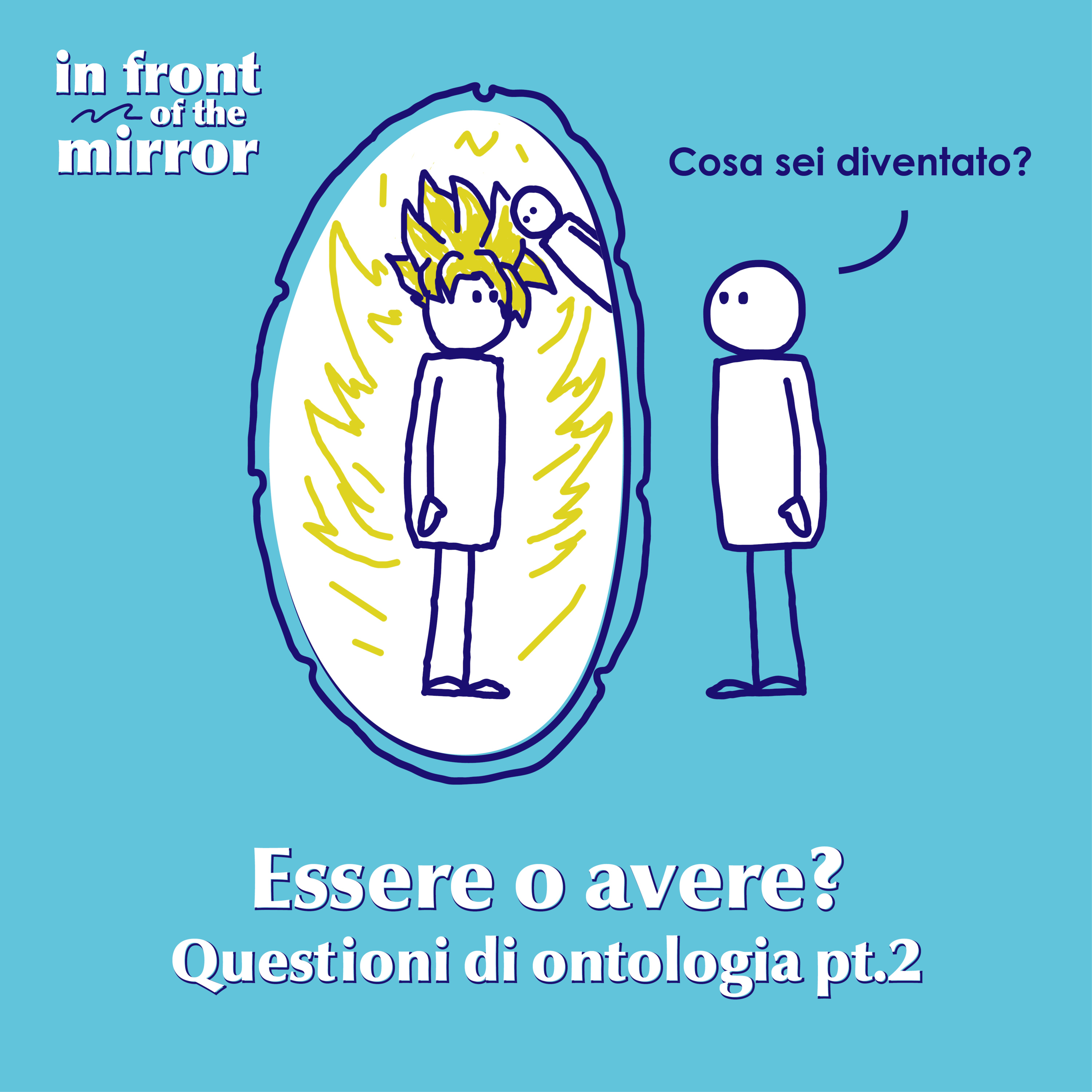 In Front of the Mirror - Il Podcast in Italiano#06 Essere o avere? Questioni di ontologia pt. 2Si è persino detto che la depressione, l’anoressia e la fobia non ce le ‘abbiamo’ mica, esse sono modi d'essere della persona. Ma che significa ‘essere’ depresso, anoressico o fobico? Si è persino detto che queste patologie non accadono alla persona, ma sono proprio mondi, che la persona abita. Quindi: si è autistici, non si ha l’autismo. O almeno, così si è detto.Si è persino detto che schizofrenici si diventa, come a raggiungere il culmine di una traiettoria unica, e personale. Ma quale formulazione può davvero rendere giustizia ai vissuti della persona?In questo episodio Cristiano...2025-07-2837 min
In Front of the Mirror - Il Podcast in Italiano#06 Essere o avere? Questioni di ontologia pt. 2Si è persino detto che la depressione, l’anoressia e la fobia non ce le ‘abbiamo’ mica, esse sono modi d'essere della persona. Ma che significa ‘essere’ depresso, anoressico o fobico? Si è persino detto che queste patologie non accadono alla persona, ma sono proprio mondi, che la persona abita. Quindi: si è autistici, non si ha l’autismo. O almeno, così si è detto.Si è persino detto che schizofrenici si diventa, come a raggiungere il culmine di una traiettoria unica, e personale. Ma quale formulazione può davvero rendere giustizia ai vissuti della persona?In questo episodio Cristiano...2025-07-2837 min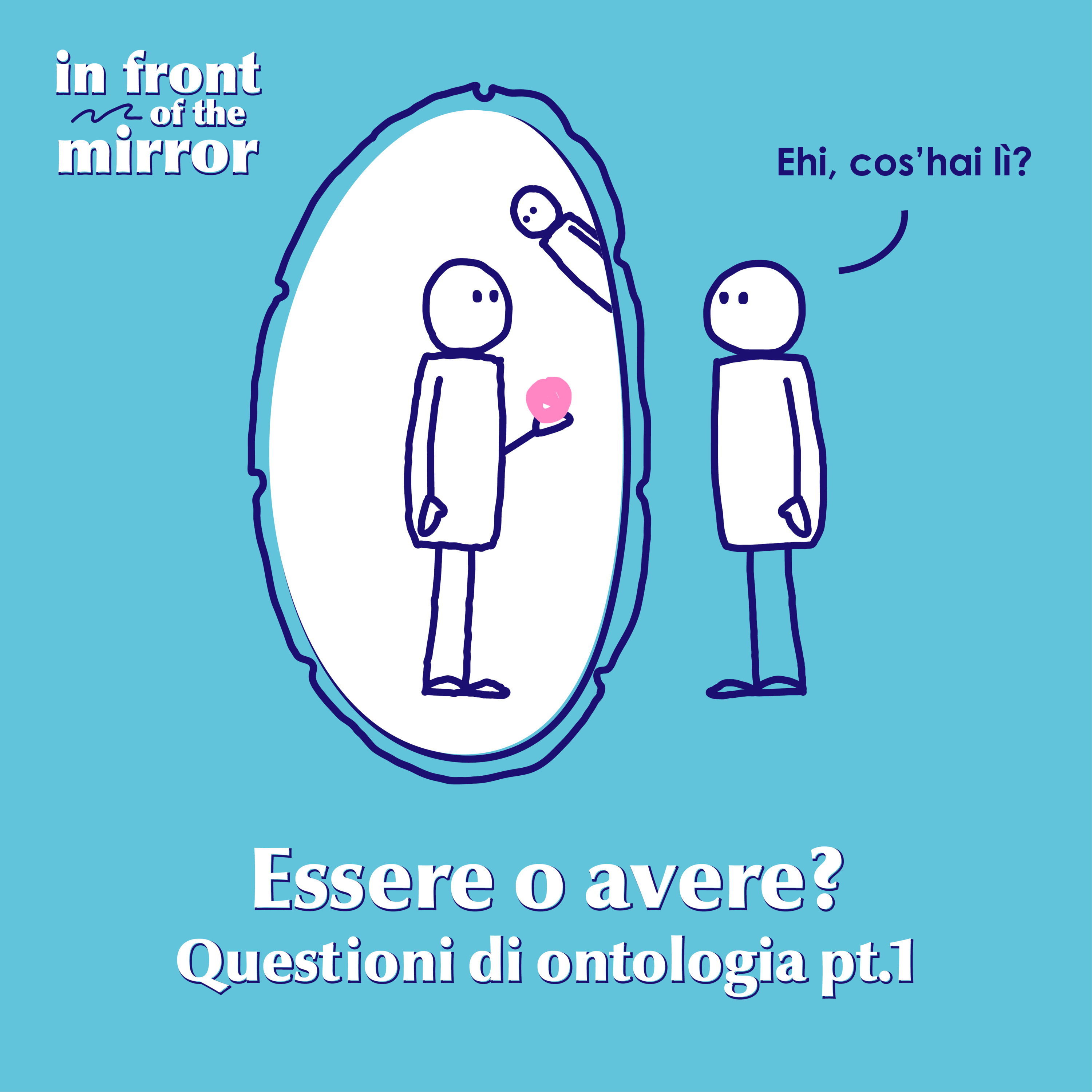 In Front of the Mirror - Il Podcast in Italiano#05 Essere o avere? Questioni di ontologia pt. 1Si dice che la depressione, l’anoressia e la fobia ce le ‘abbiamo’, e ne ‘soffriamo’. Ma che significa ‘avere’ una condizione psichiatrica?Si dice che queste patologie accadono alla persona, e ad essa sono estranee. Quindi: l’autismo lo si ha, non si è autistici. O almeno così si dice.Si dice che questa formulazione sia anche e soprattutto una conquista morale. Così facendo, smettiamo di incolpare la persona. Ma è davvero questo che può alleviare lo stigma?In questo episodio Giacomo si fa portavoce della formulazione “avere”. Ma Cristiano ha delle obiezioni.Quindi: la malattia men...2025-07-1438 min
In Front of the Mirror - Il Podcast in Italiano#05 Essere o avere? Questioni di ontologia pt. 1Si dice che la depressione, l’anoressia e la fobia ce le ‘abbiamo’, e ne ‘soffriamo’. Ma che significa ‘avere’ una condizione psichiatrica?Si dice che queste patologie accadono alla persona, e ad essa sono estranee. Quindi: l’autismo lo si ha, non si è autistici. O almeno così si dice.Si dice che questa formulazione sia anche e soprattutto una conquista morale. Così facendo, smettiamo di incolpare la persona. Ma è davvero questo che può alleviare lo stigma?In questo episodio Giacomo si fa portavoce della formulazione “avere”. Ma Cristiano ha delle obiezioni.Quindi: la malattia men...2025-07-1438 min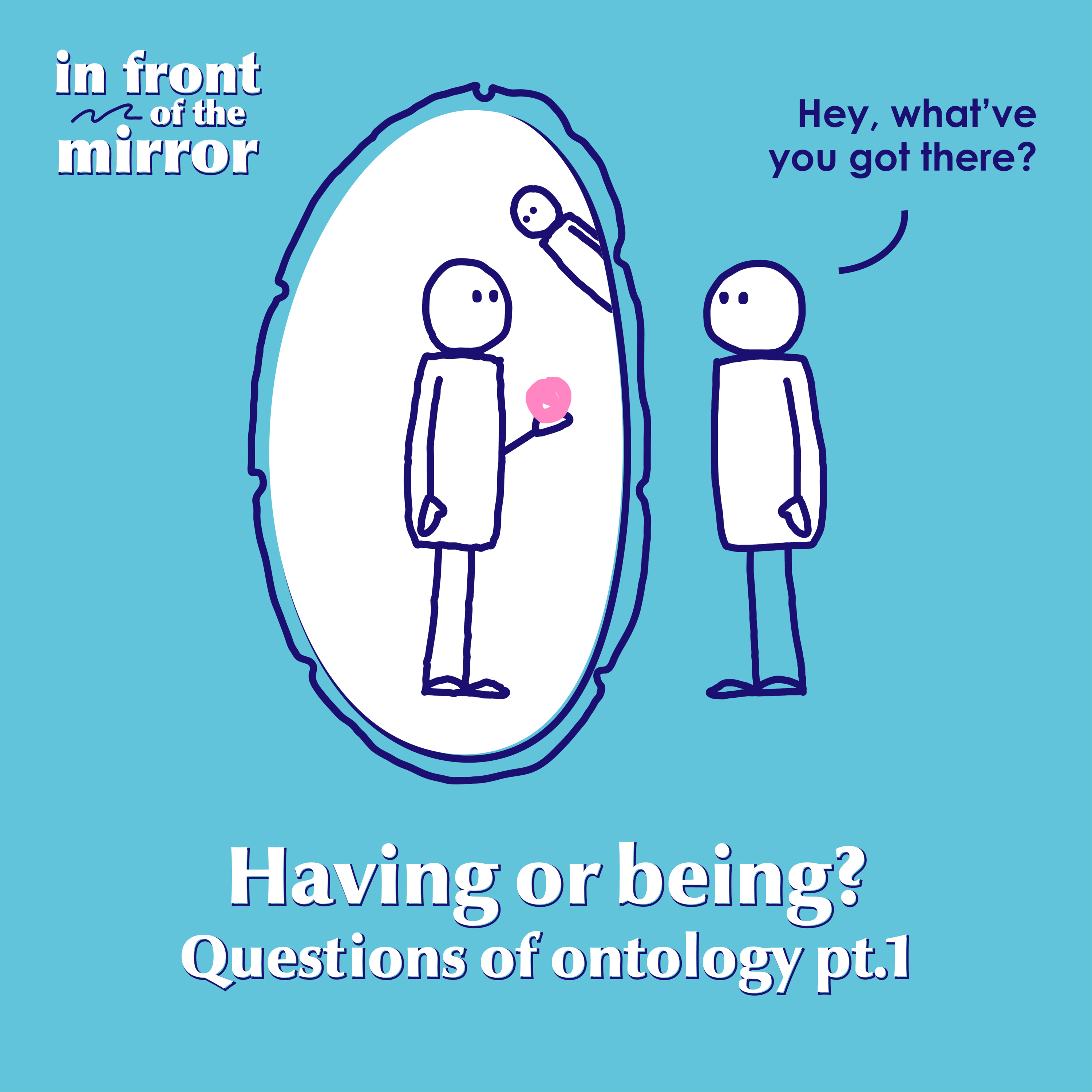 In Front of the Mirror - The English Podcast#05 Having or being? Questions of ontology pt. 1One says that depression, anorexia and phobia is something we ‘have’, and ‘suffer from’. But what does ‘having’ a psychiatric condition mean?One says these pathologies happen to the person, and are foreign to them. So: one is not autistic, one has autism. Or, at least, this is what they say.One says that this formulation is first and foremost a moral conquest. In assuming so, we stop blaming the person. But can this really alleviate the stigma?In this episode Giacomo will be the spokesperson of the “having” formulation. But Cristiano has got some objecti...2025-07-1432 min
In Front of the Mirror - The English Podcast#05 Having or being? Questions of ontology pt. 1One says that depression, anorexia and phobia is something we ‘have’, and ‘suffer from’. But what does ‘having’ a psychiatric condition mean?One says these pathologies happen to the person, and are foreign to them. So: one is not autistic, one has autism. Or, at least, this is what they say.One says that this formulation is first and foremost a moral conquest. In assuming so, we stop blaming the person. But can this really alleviate the stigma?In this episode Giacomo will be the spokesperson of the “having” formulation. But Cristiano has got some objecti...2025-07-1432 min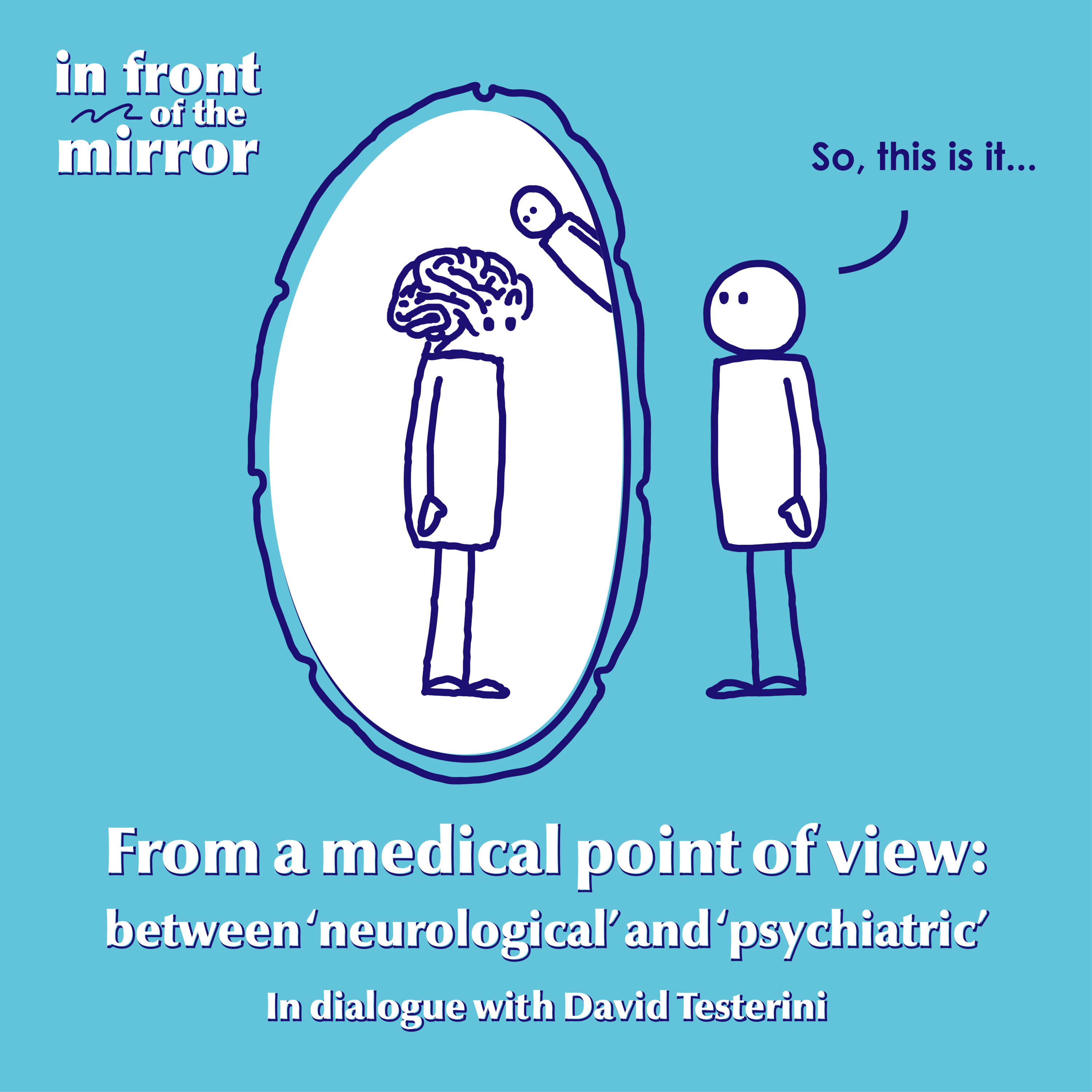 In Front of the Mirror - The English Podcast#04 From a medical point of view: between ‘neurological’ and ‘psychiatric’. In dialogue with David Tèstérini"Is this pathology neurological or psychiatric?". Physicians often wonder about it. How can they identify and distinguish between these two categories?What if the two are entangled, as the case of organic pathologies with psychiatric symptoms shows?And since when are shoes part of psychiatric semeiotics?Today we are pleased to discuss these topics with David Tèstérini, physician and neurologist.About the guest:David Tèstérini holds a degree in medicine with a specialization in functional neurology, along with academic training in bioethics, phil...2025-06-3029 min
In Front of the Mirror - The English Podcast#04 From a medical point of view: between ‘neurological’ and ‘psychiatric’. In dialogue with David Tèstérini"Is this pathology neurological or psychiatric?". Physicians often wonder about it. How can they identify and distinguish between these two categories?What if the two are entangled, as the case of organic pathologies with psychiatric symptoms shows?And since when are shoes part of psychiatric semeiotics?Today we are pleased to discuss these topics with David Tèstérini, physician and neurologist.About the guest:David Tèstérini holds a degree in medicine with a specialization in functional neurology, along with academic training in bioethics, phil...2025-06-3029 min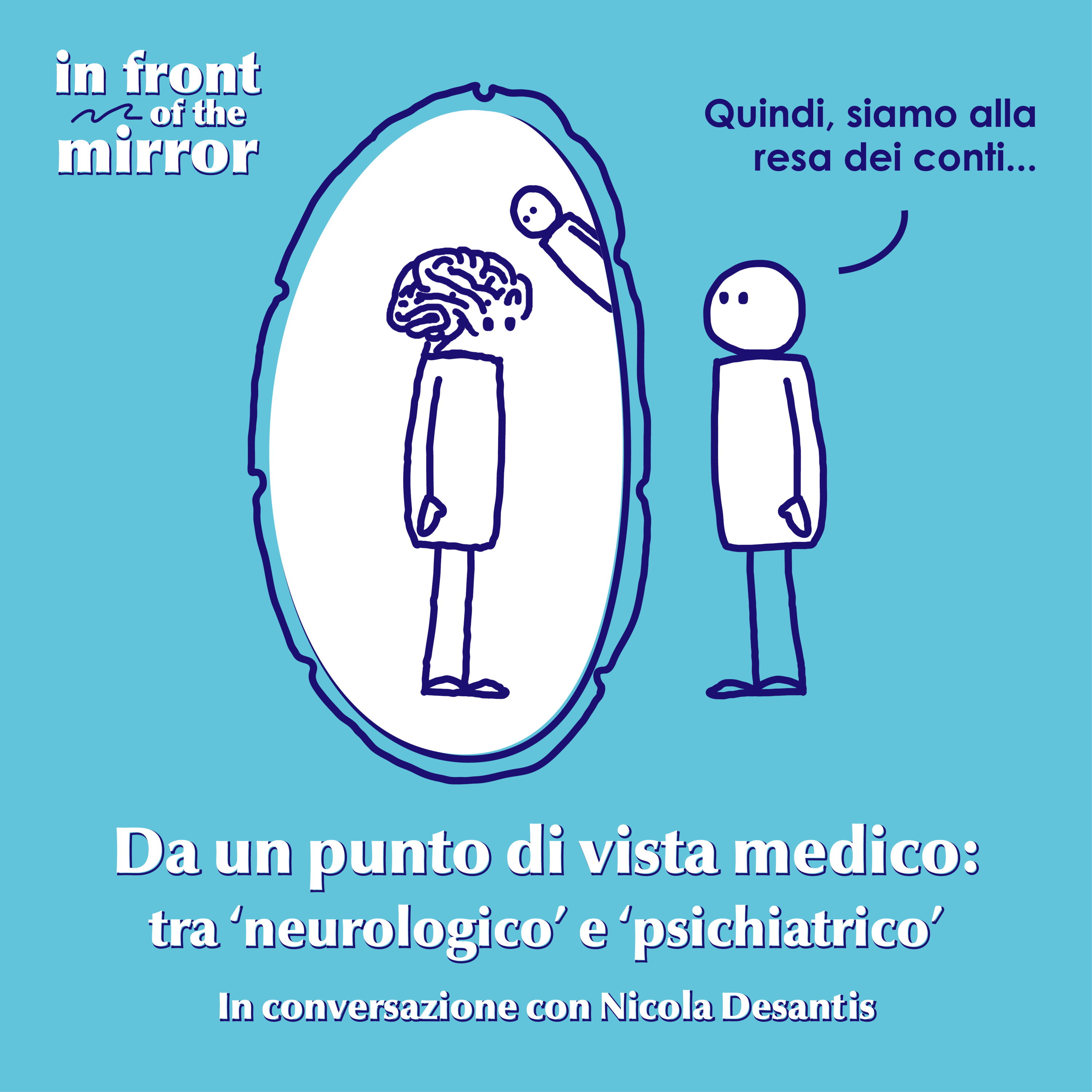 In Front of the Mirror - Il Podcast in Italiano#04 Da un punto di vista medico: tra 'neurologico' e 'psichiatrico'. In conversazione con Nicola Desantis"Ma questa patologia è neurologica o psichiatrica?". I medici se lo chiedono spesso. Come possono individuare e distinguere queste due categorie?E se le due si intrecciano, come nel caso di patologie organiche con sintomi psichiatrici?E cosa c'entrano le scarpe con la semeiotica psichiatrica?Oggi ne parliamo con Nicola Desantis, studente di medicina prossimo alla Laurea.Riguardo l'ospite: Nicola Desantis studia medicina presso l'Università degli Studi "G.d'Annunzio" Chieti - Pescara, ed è un aspirante chirurgo. Ha svolto il tirocinio abilitante presso l’ospedale di Chieti, ed esper...2025-06-3034 min
In Front of the Mirror - Il Podcast in Italiano#04 Da un punto di vista medico: tra 'neurologico' e 'psichiatrico'. In conversazione con Nicola Desantis"Ma questa patologia è neurologica o psichiatrica?". I medici se lo chiedono spesso. Come possono individuare e distinguere queste due categorie?E se le due si intrecciano, come nel caso di patologie organiche con sintomi psichiatrici?E cosa c'entrano le scarpe con la semeiotica psichiatrica?Oggi ne parliamo con Nicola Desantis, studente di medicina prossimo alla Laurea.Riguardo l'ospite: Nicola Desantis studia medicina presso l'Università degli Studi "G.d'Annunzio" Chieti - Pescara, ed è un aspirante chirurgo. Ha svolto il tirocinio abilitante presso l’ospedale di Chieti, ed esper...2025-06-3034 min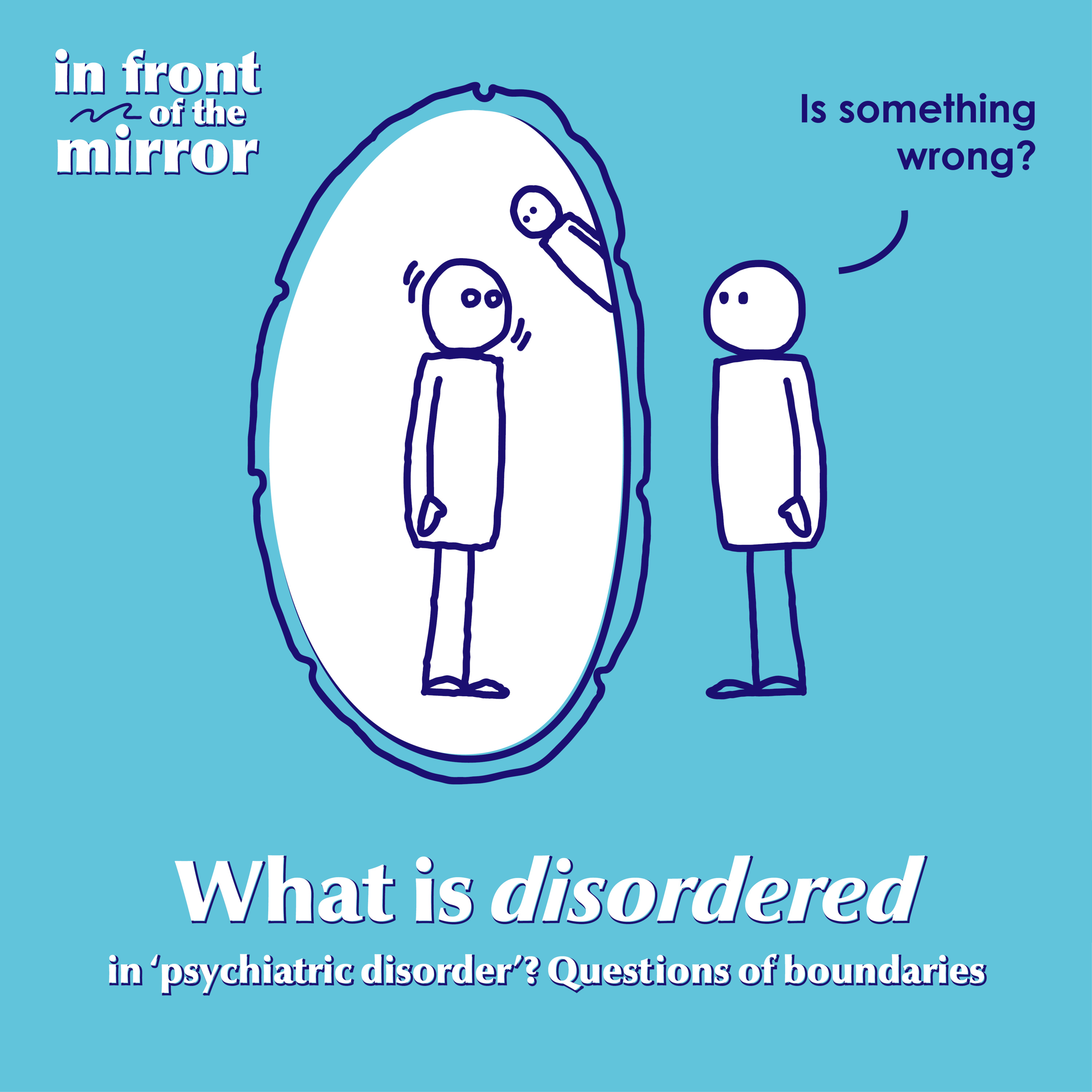 In Front of the Mirror - The English Podcast#03 What is "disordered" in 'psychiatric disorder'? Questions of boundariesWhat makes a pattern of behavior, thinking and feeling a disorder, a pathology?Is it the presence of a dysfunction, suffering, a conflict with societal norms?Can these criteria truly demarcate what is defined as pathological from what is not?In this episode, Cristiano will scrutinize these very criteria, questioning them.This episode continues the analysis that Giacomo began in the previous one, between normality and normativity.References:Bortolotti, L. (2023). Why Delusions Matter. Bloomsbury PublishingButler, PV (2000)Reverse Othello syndrome subsequent to traumatic...2025-06-1632 min
In Front of the Mirror - The English Podcast#03 What is "disordered" in 'psychiatric disorder'? Questions of boundariesWhat makes a pattern of behavior, thinking and feeling a disorder, a pathology?Is it the presence of a dysfunction, suffering, a conflict with societal norms?Can these criteria truly demarcate what is defined as pathological from what is not?In this episode, Cristiano will scrutinize these very criteria, questioning them.This episode continues the analysis that Giacomo began in the previous one, between normality and normativity.References:Bortolotti, L. (2023). Why Delusions Matter. Bloomsbury PublishingButler, PV (2000)Reverse Othello syndrome subsequent to traumatic...2025-06-1632 min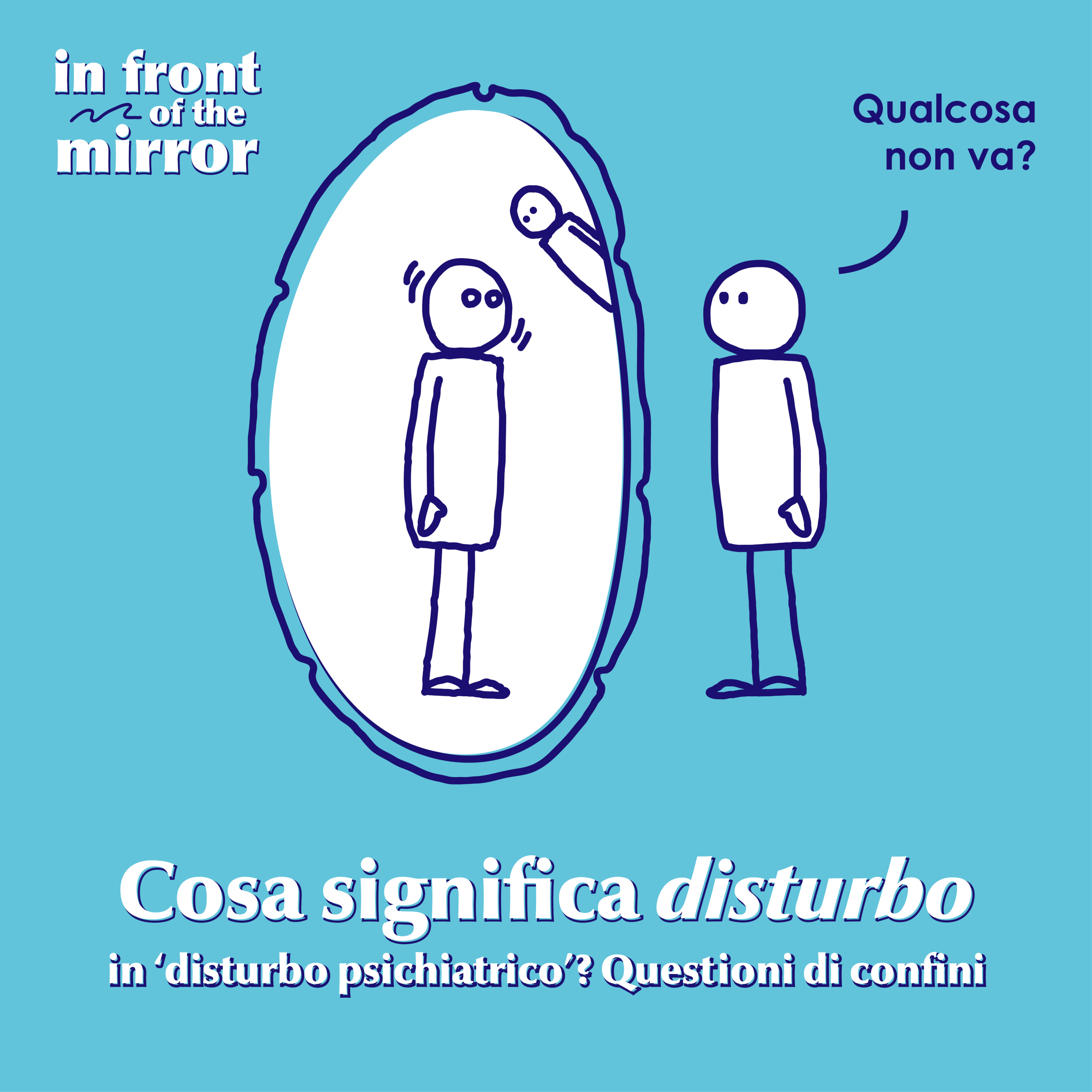 In Front of the Mirror - Il Podcast in Italiano#03 Cosa significa "disturbo" in 'disturbo psichiatrico'? Questioni di confiniCos'è che rende una certa configurazione di comportamenti, di pensieri, di emozioni, un disturbo, una patologia?La presenza di una disfunzione, la sofferenza, un conflitto con le norme sociali?Possono questi criteri demarcare ciò che viene definito patologico, da ciò che non lo è?In questo episodio, Cristiano passerà in rassegna proprio questi criteri, mettendoli in discussione.Questo episodio porta avanti la disamina che Giacomo ha iniziato nella puntata precedente, tra normalità e normatività.Bibliografia di riferimento:Bortolotti, L. (2023). Why Delusions Matter. Bloomsbury PublishingButler, PV (2000) Reverse...2025-06-1632 min
In Front of the Mirror - Il Podcast in Italiano#03 Cosa significa "disturbo" in 'disturbo psichiatrico'? Questioni di confiniCos'è che rende una certa configurazione di comportamenti, di pensieri, di emozioni, un disturbo, una patologia?La presenza di una disfunzione, la sofferenza, un conflitto con le norme sociali?Possono questi criteri demarcare ciò che viene definito patologico, da ciò che non lo è?In questo episodio, Cristiano passerà in rassegna proprio questi criteri, mettendoli in discussione.Questo episodio porta avanti la disamina che Giacomo ha iniziato nella puntata precedente, tra normalità e normatività.Bibliografia di riferimento:Bortolotti, L. (2023). Why Delusions Matter. Bloomsbury PublishingButler, PV (2000) Reverse...2025-06-1632 min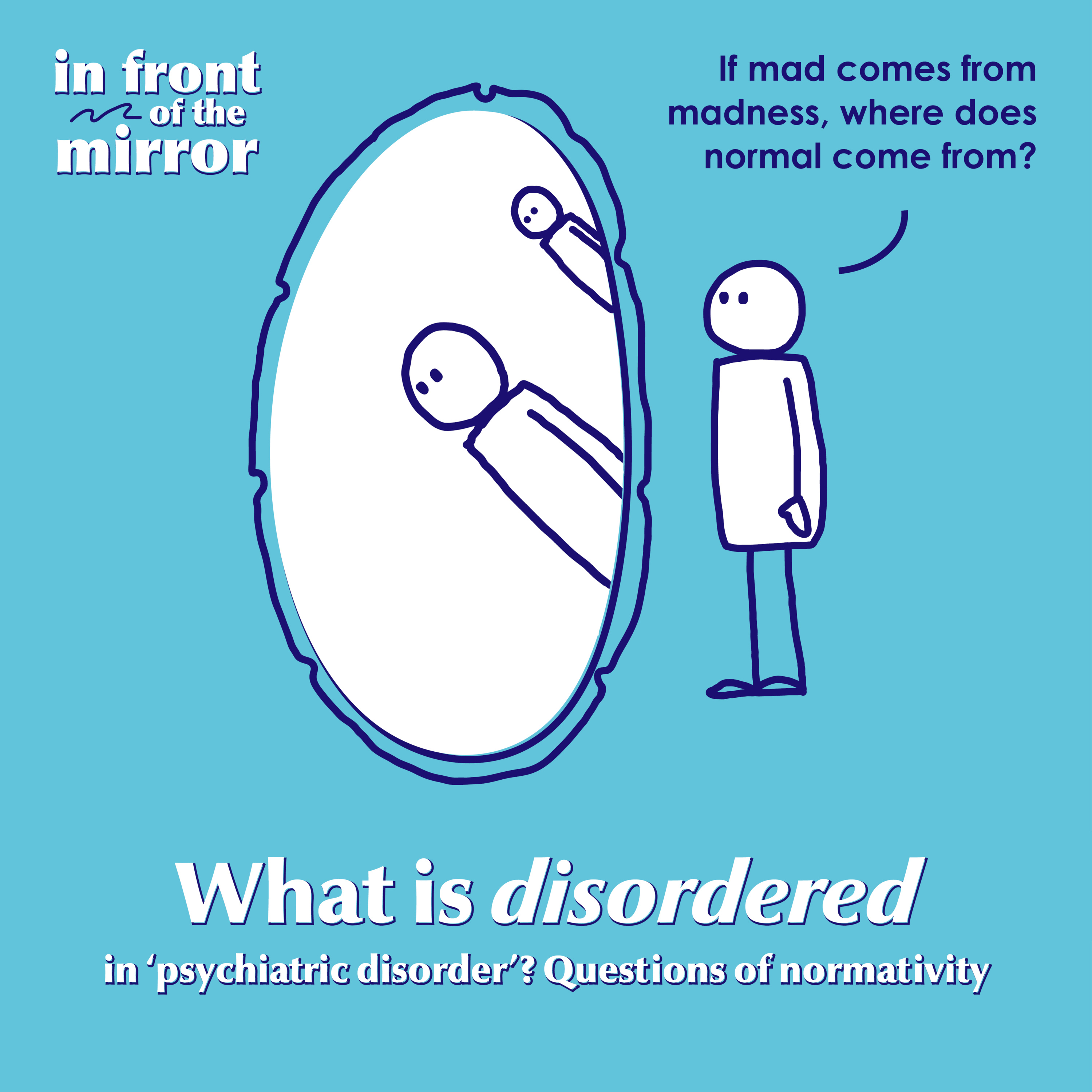 In Front of the Mirror - The English Podcast#02 What is "disordered" in 'psychiatric disorder'? Questions of normativityWhen one claims that something or someone is normal, what do they mean?And when one claims that is not, normal?Could investigating what a norm is, or what a rule is, ever help us make sense of all of it?In this episode, Giacomo embarks on a journey through the concepts that underlie and support our idea of normality. In the next episode, Cristiano will continue by talking about boundaries.References:Carrère E. (1993). I am alive and you are dead. A journey into the m...2025-06-0230 min
In Front of the Mirror - The English Podcast#02 What is "disordered" in 'psychiatric disorder'? Questions of normativityWhen one claims that something or someone is normal, what do they mean?And when one claims that is not, normal?Could investigating what a norm is, or what a rule is, ever help us make sense of all of it?In this episode, Giacomo embarks on a journey through the concepts that underlie and support our idea of normality. In the next episode, Cristiano will continue by talking about boundaries.References:Carrère E. (1993). I am alive and you are dead. A journey into the m...2025-06-0230 min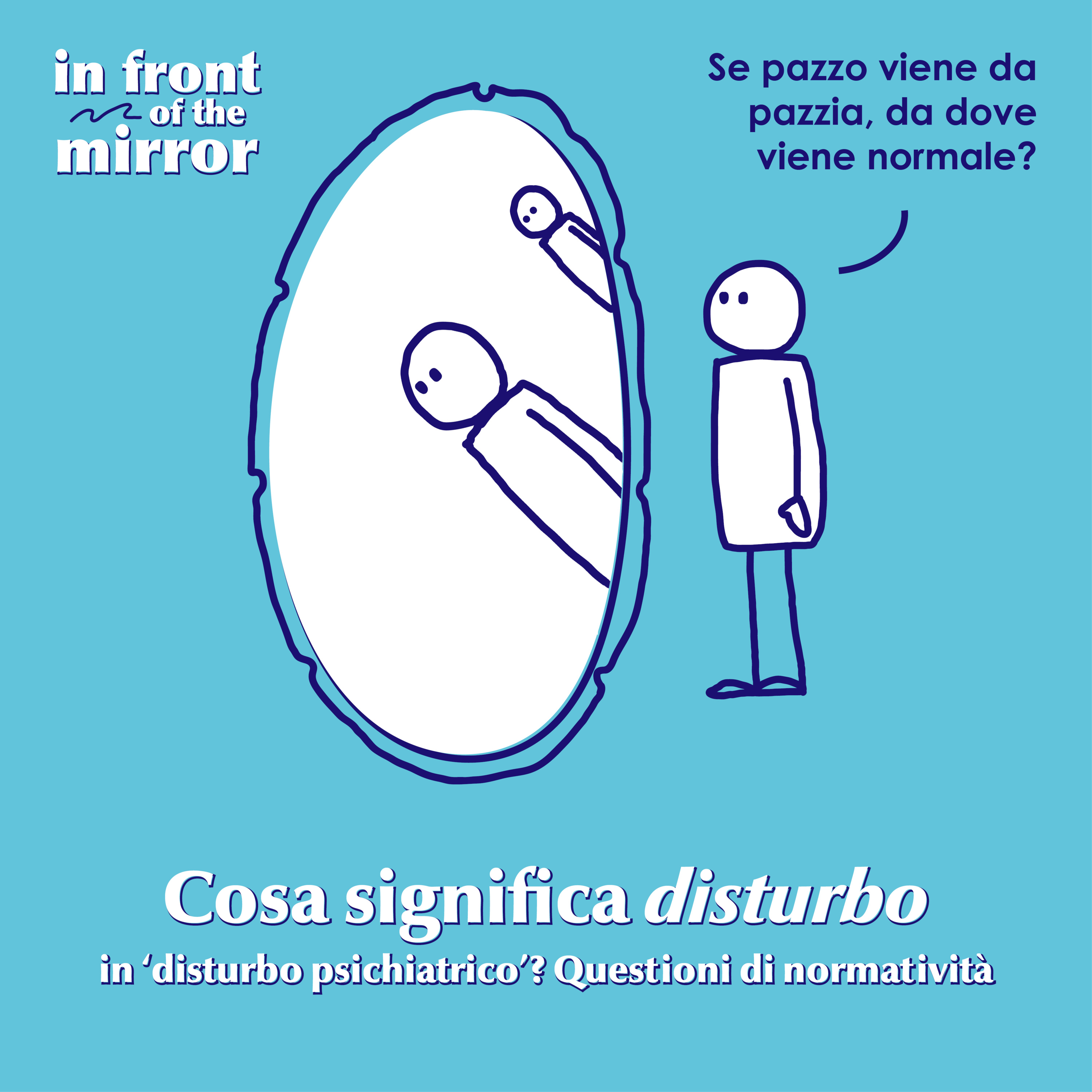 In Front of the Mirror - Il Podcast in Italiano#02 Cosa significa "disturbo" in 'disturbo psichiatrico'? Questioni di normativitàQuando diciamo che qualcosa o qualcuno è normale, cosa intendiamo?E quando diciamo che non lo è, normale?Indagare cosa è una norma, o cosa è una regola, potrebbe mai aiutare a capirci qualcosa? In questo episodio Giacomo si addentrerà in un viaggio tra i concetti che sottendono e sostengono la nostra idea di normalità. Nel prossimo, Cristiano proseguirà parlandoci di confini. Bibliografia di riferimento:Carrère E. (1993). Io sono vivo, voi siete morti. Adelphi Edizioni.Copp D. (2022). Normativity in Metaetichs. Stanford Encyclopidia of Philosophy.2025-06-0231 min
In Front of the Mirror - Il Podcast in Italiano#02 Cosa significa "disturbo" in 'disturbo psichiatrico'? Questioni di normativitàQuando diciamo che qualcosa o qualcuno è normale, cosa intendiamo?E quando diciamo che non lo è, normale?Indagare cosa è una norma, o cosa è una regola, potrebbe mai aiutare a capirci qualcosa? In questo episodio Giacomo si addentrerà in un viaggio tra i concetti che sottendono e sostengono la nostra idea di normalità. Nel prossimo, Cristiano proseguirà parlandoci di confini. Bibliografia di riferimento:Carrère E. (1993). Io sono vivo, voi siete morti. Adelphi Edizioni.Copp D. (2022). Normativity in Metaetichs. Stanford Encyclopidia of Philosophy.2025-06-0231 min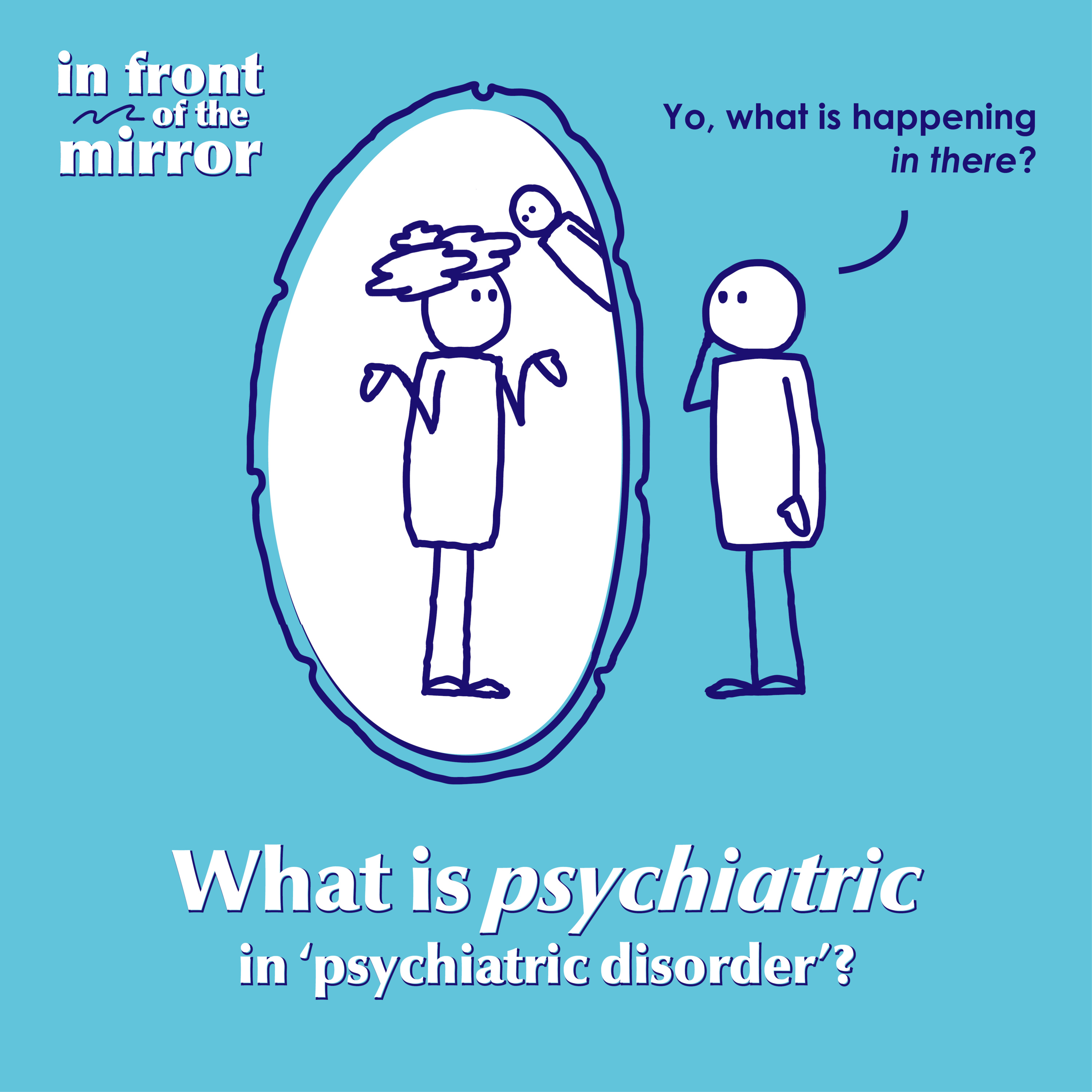 In Front of the Mirror - The English Podcast#01 What is "psychiatric" in 'psychiatric disorder'?When one claims that a disorder is psychiatric:What is the intrinsic nature of this adjective? What makes some kinds of experiences psychiatric, instead of something else? And, in what way do these experiences affect the person who goes through them?References:de Haan, S.(2020). Enactive Psychiatry. Cambridge University Press.Dennett, D. C. (2013). Intuition pumps and other tools for thinking. Penguin Books.Freud, S. (1940). An outline of psycho-analysis. The International Journal of Psychoanalysis.Kandel, E.R. (2018). The d...2025-05-1922 min
In Front of the Mirror - The English Podcast#01 What is "psychiatric" in 'psychiatric disorder'?When one claims that a disorder is psychiatric:What is the intrinsic nature of this adjective? What makes some kinds of experiences psychiatric, instead of something else? And, in what way do these experiences affect the person who goes through them?References:de Haan, S.(2020). Enactive Psychiatry. Cambridge University Press.Dennett, D. C. (2013). Intuition pumps and other tools for thinking. Penguin Books.Freud, S. (1940). An outline of psycho-analysis. The International Journal of Psychoanalysis.Kandel, E.R. (2018). The d...2025-05-1922 min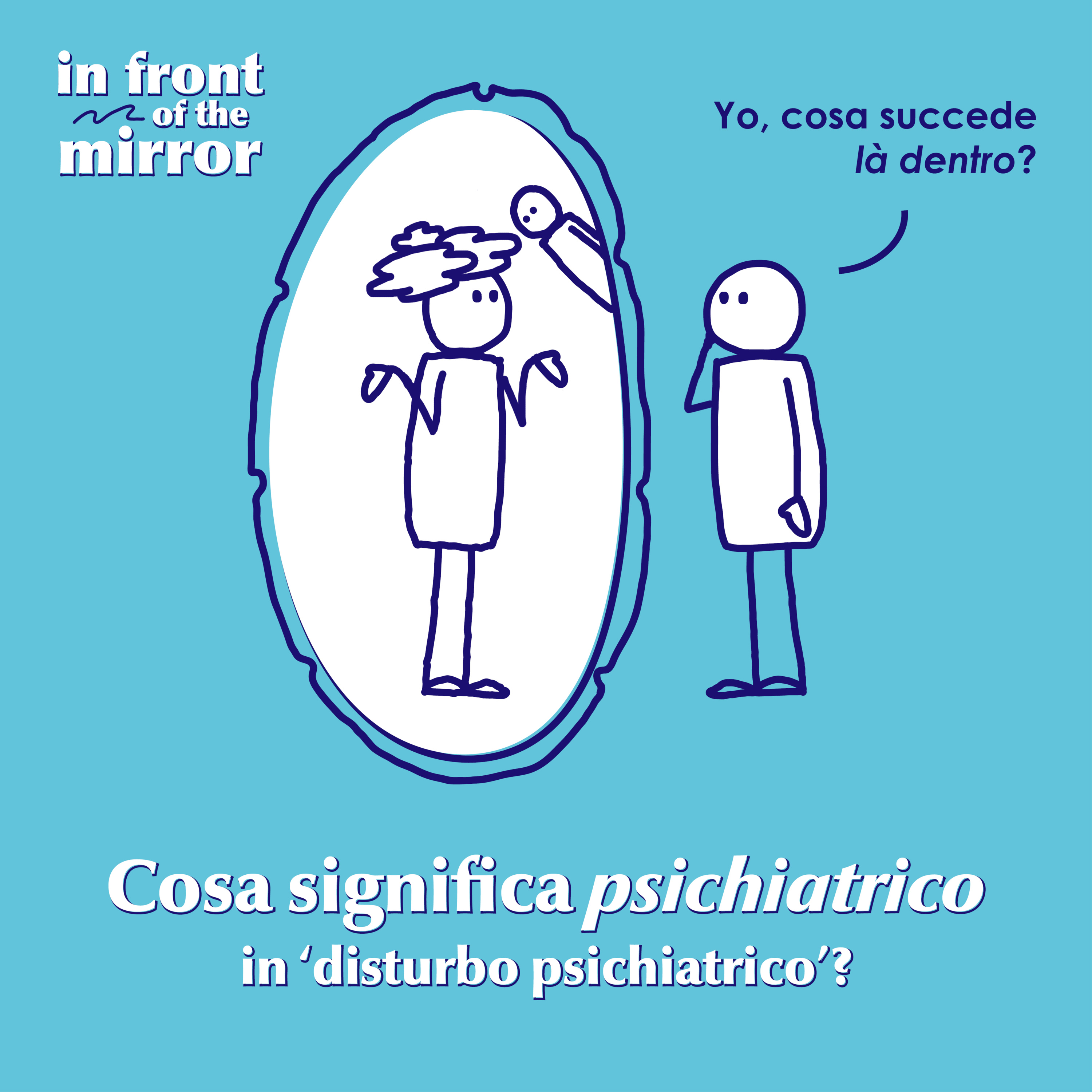 In Front of the Mirror - Il Podcast in Italiano#01 Cosa significa "psichiatrico" in 'disturbo psichiatrico'?Quando si dice di un disturbo che è psichiatrico: Qual è la natura intrinseca di questo aggettivo? Cosa rende un insieme di esperienze di carattere psichiatrico? In che modo, queste esperienze, coinvolgono la persona che ne fa esperienza?Bibliografia di riferimento:de Haan, S.(2020). Psichiatria enattiva. Casa editrice Astrolabio-Ubaldini Editore. Dennett, D. C. (2014). Strumenti per pensare. Raffaello Cortina Editore.Freud, S. (1940). Compendio di psicoanalisi. Biblioteca Bollati Boringhieri.Kandel, E.R. (2018). La Mente alterata. Cosa dicono di noi le anomalie del...2025-05-1929 min
In Front of the Mirror - Il Podcast in Italiano#01 Cosa significa "psichiatrico" in 'disturbo psichiatrico'?Quando si dice di un disturbo che è psichiatrico: Qual è la natura intrinseca di questo aggettivo? Cosa rende un insieme di esperienze di carattere psichiatrico? In che modo, queste esperienze, coinvolgono la persona che ne fa esperienza?Bibliografia di riferimento:de Haan, S.(2020). Psichiatria enattiva. Casa editrice Astrolabio-Ubaldini Editore. Dennett, D. C. (2014). Strumenti per pensare. Raffaello Cortina Editore.Freud, S. (1940). Compendio di psicoanalisi. Biblioteca Bollati Boringhieri.Kandel, E.R. (2018). La Mente alterata. Cosa dicono di noi le anomalie del...2025-05-1929 min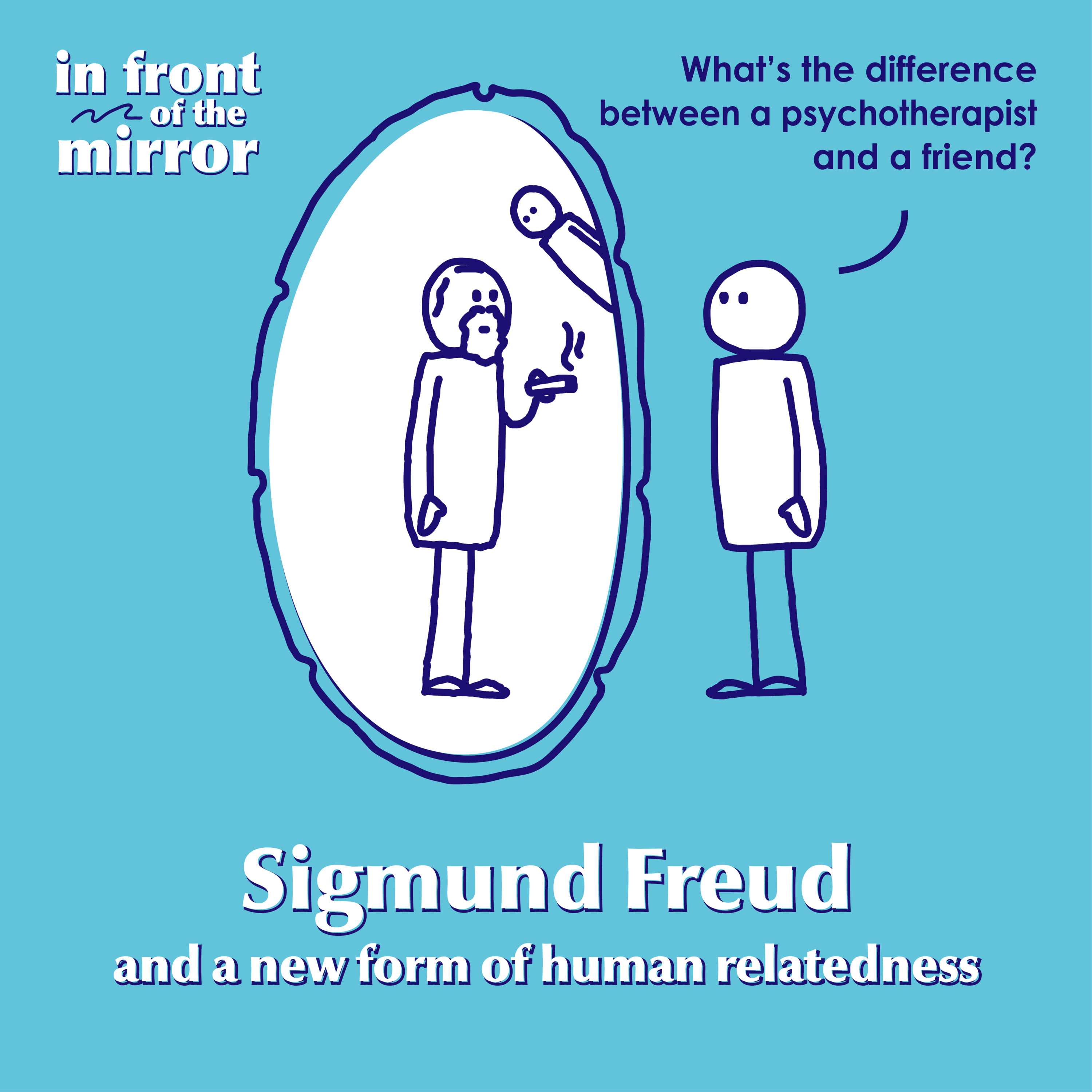 In Front of the Mirror - The English Podcast#00 Sigmund Freud and a new form of human relatednessWhat was Sigmund Freud's greatest discovery?What's the difference between a psychotherapist, and your trusted hairdresser?And what makes the therapeutic relationship truly unique?We discuss all this and more in our pilot episode!References: Ogden, T. H. (2005). This art of psychoanalysis. Dreaming undreamt dreams and interrupted cries. Routledge/Taylor & Francis Group.Freud, S. (1940). An outline of psycho-analysis. The International Journal of Psychoanalysis, 21, 27–84.Eagle, M. N. (2011). From classical to contemporary psychoanalysis: A critique and integration. Routledge.2025-05-0520 min
In Front of the Mirror - The English Podcast#00 Sigmund Freud and a new form of human relatednessWhat was Sigmund Freud's greatest discovery?What's the difference between a psychotherapist, and your trusted hairdresser?And what makes the therapeutic relationship truly unique?We discuss all this and more in our pilot episode!References: Ogden, T. H. (2005). This art of psychoanalysis. Dreaming undreamt dreams and interrupted cries. Routledge/Taylor & Francis Group.Freud, S. (1940). An outline of psycho-analysis. The International Journal of Psychoanalysis, 21, 27–84.Eagle, M. N. (2011). From classical to contemporary psychoanalysis: A critique and integration. Routledge.2025-05-0520 min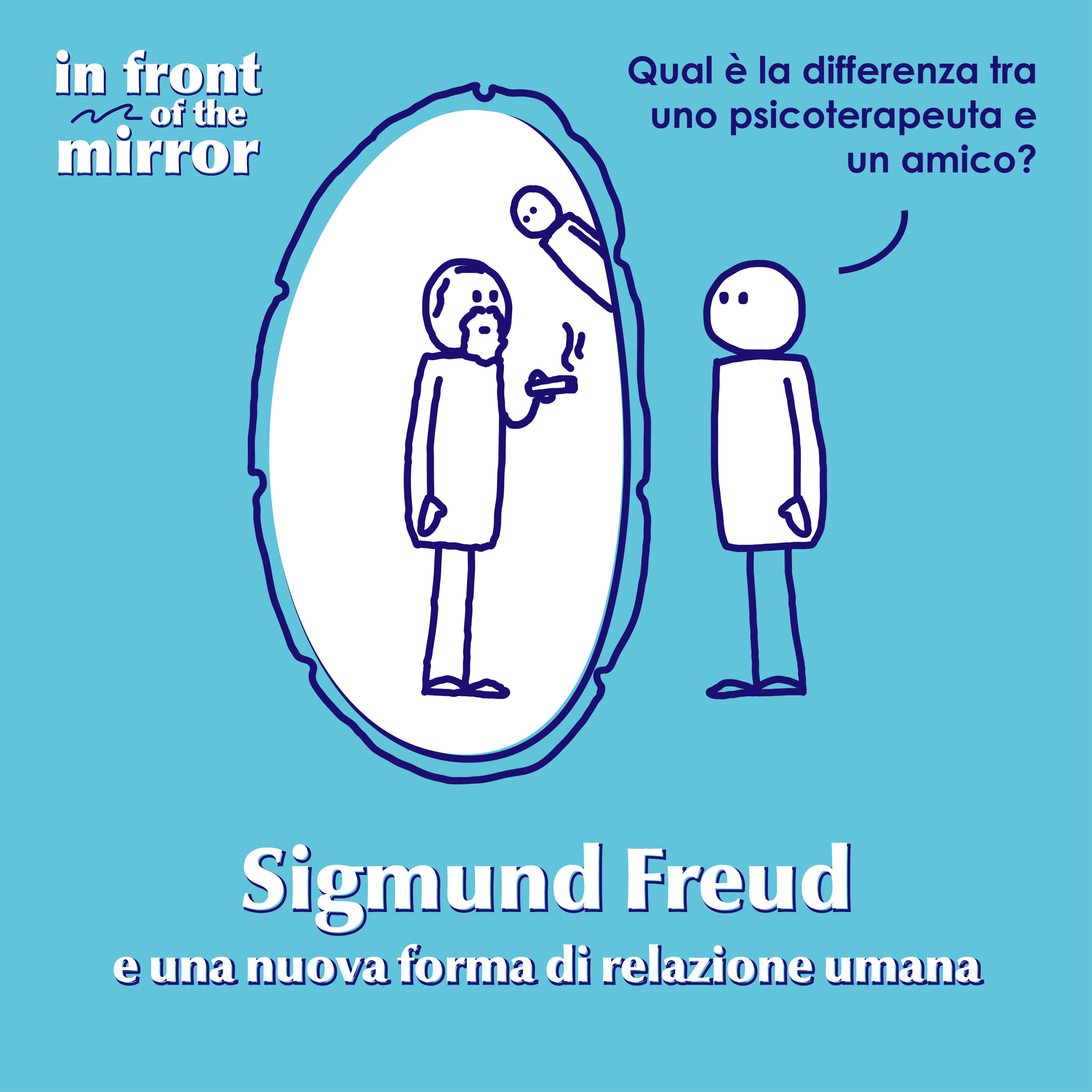 In Front of the Mirror - Il Podcast in Italiano#00 Sigmund Freud e una nuova forma di relazione umanaQual è stata la più grande scoperta di Sigmund Freud?Qual è la differenza tra una psicoterapeuta, e il vostro parrucchiere di fiducia?E ancora, cosa rende la relazione terapeutica, veramente unica?Ne parliamo nel nostro episodio pilota!Bibliografia di riferimento:Ogden, T. H. (2008). L’arte della psicoterapia. Milano: Raffaello Cortina Editore.Freud, S. (1940/80). Compendio di psicoanalisi. Torino: Boringhieri.Eagle, M. N. (2012). Da Freud alla psicoanalisi contemporanea. Milano: Raffaello Cortina Editore-Ogni due settimane, il lunedì alle 1...2025-05-0520 min
In Front of the Mirror - Il Podcast in Italiano#00 Sigmund Freud e una nuova forma di relazione umanaQual è stata la più grande scoperta di Sigmund Freud?Qual è la differenza tra una psicoterapeuta, e il vostro parrucchiere di fiducia?E ancora, cosa rende la relazione terapeutica, veramente unica?Ne parliamo nel nostro episodio pilota!Bibliografia di riferimento:Ogden, T. H. (2008). L’arte della psicoterapia. Milano: Raffaello Cortina Editore.Freud, S. (1940/80). Compendio di psicoanalisi. Torino: Boringhieri.Eagle, M. N. (2012). Da Freud alla psicoanalisi contemporanea. Milano: Raffaello Cortina Editore-Ogni due settimane, il lunedì alle 1...2025-05-0520 min In Front of the Mirror - Il Podcast in ItalianoTrailer - In Front of the MirrorTrailer - In Front of the Mirror2025-05-0101 min
In Front of the Mirror - Il Podcast in ItalianoTrailer - In Front of the MirrorTrailer - In Front of the Mirror2025-05-0101 min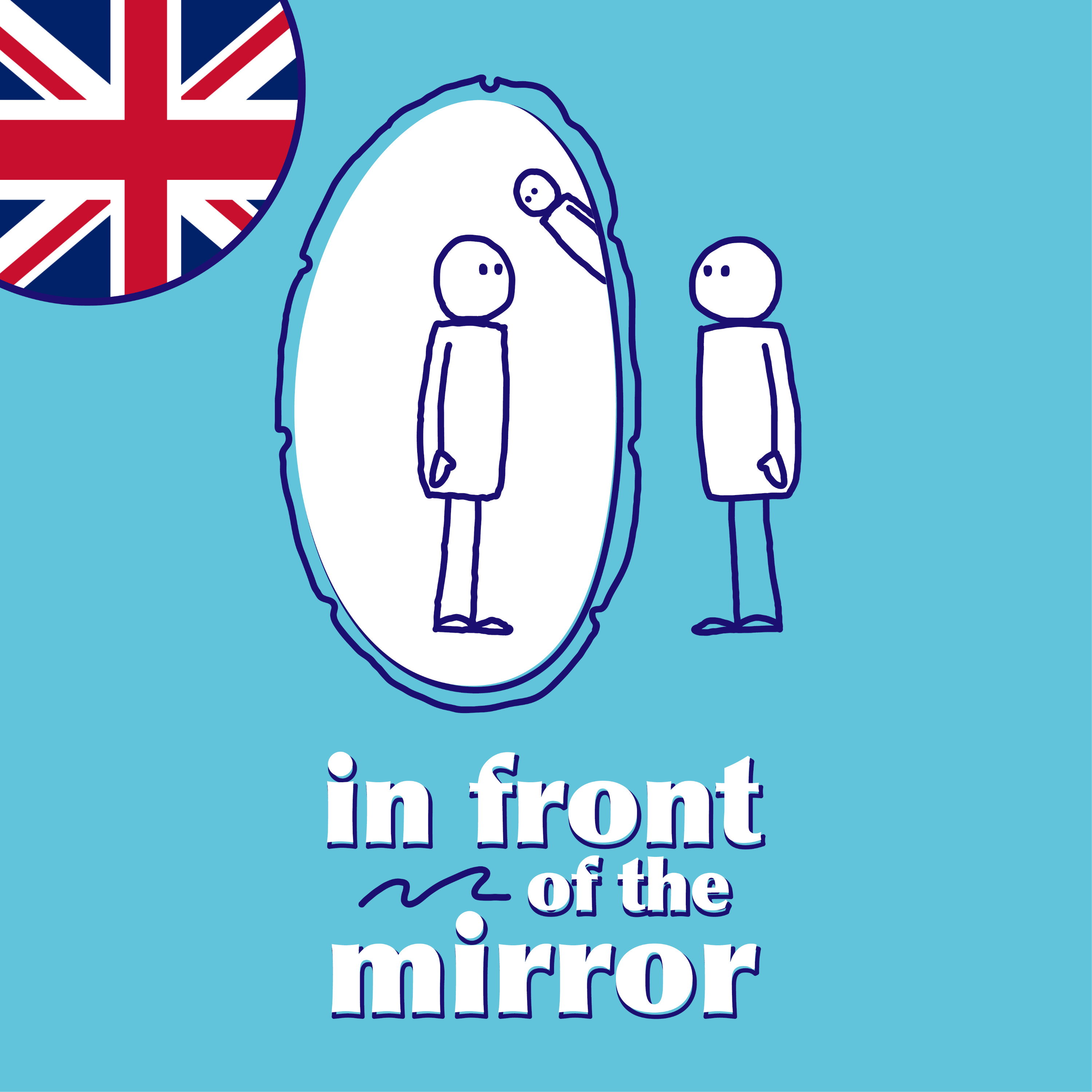 In Front of the Mirror - The English PodcastTrailer - In Front of the MirrorTrailer - In Front of the Mirror2025-05-0101 min
In Front of the Mirror - The English PodcastTrailer - In Front of the MirrorTrailer - In Front of the Mirror2025-05-0101 min